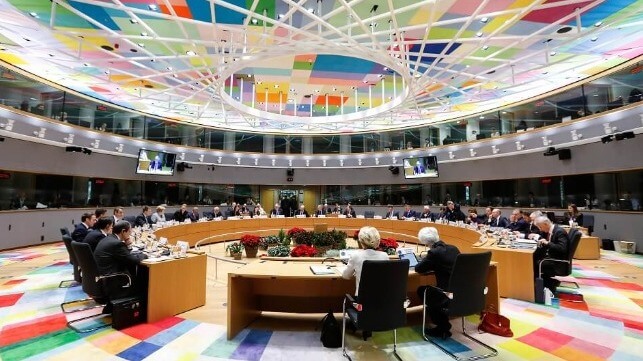But the EU Council and Parliament still need to decide who pays and where the money goes

The European Parliament and the European Council have both finalized their negotiating positions on landmark reforms to the EU’s climate regulations, including – for the first time – the inclusion of the maritime sector in Europe’s Emissions Trading System (ETS).
The two bodies are in close agreement, except for two significant points: first, the use of the revenue from auctioning maritime emissions allowances; and second, who will have to pay the bill. The Council wants to ensure that “national budgets of member states will benefit” from the revenue (not shipping research), and it puts the shipmanager or shipowner on the hook for paying (not the charterer).
Both plans would extend the existing EU ETS to cover 100 percent of emissions on intra-European routes and 50 percent of emissions on overseas routes. Both agree that non-CO2 GHG emissions should be tracked, though the Council’s version would defer a final decision on whether to count methane in the ETS until a later date.
The Council would like to see:
- Placement of compliance burden on the vessel owner/operator, who could optionally negotiate with the charterer on a contractual mechanism for sharing cost. By contrast, the European Parliament’s proposal makes a contractual cost pass-along mechanism mandatory.
- Allocation of all revenues from allowance auctions to the administering member state (the flag state for an EU ship, or the state where the shipowner calls most often for a foreign-flag ship).
- Requiring shipping researchers to apply to the EU’s general-purpose Innovation Fund for green-transition financing, with “due consideration” assured for maritime-related projects
- Redistribution of 3.5 percent of emissions allowances to member states that are heavily dependent on maritime transport
- Transitional measures for small islands, winter navigation and voyages related to public service obligations
- Measures to protect EU shipping from carbon leakage (businesses exporting operations to countries with less stringent regulations)
The Parliament would like to see:
- Emissions from non-EU voyages covered 100 percent after 2027, with some exceptions under certain conditions
- Non-CO2 greenhouse gases (methane) included in ETS calculations
- 75 percent of all revenues from maritime allowances assigned to a dedicated “Ocean Fund” to support the industry’s green transition
- “Polluter-pays” compliance cost allocation using mandatory contractual pass-through of the costs to the commercial operator (charterer)
Both versions omit lifecycle emissions from the calculation mechanism, leaving out emissions from fuel production and transport (notably methane leakage from natural gas infrastructure).
The two bodies will now meet and negotiate the text of a large-scale legislative package, including emissions measures for other sectors like road transport and aviation.
Source; https://www.maritime-executive.com/article/eu-council-and-parliament-set-to-negotiate-maritime-ghg-regulations